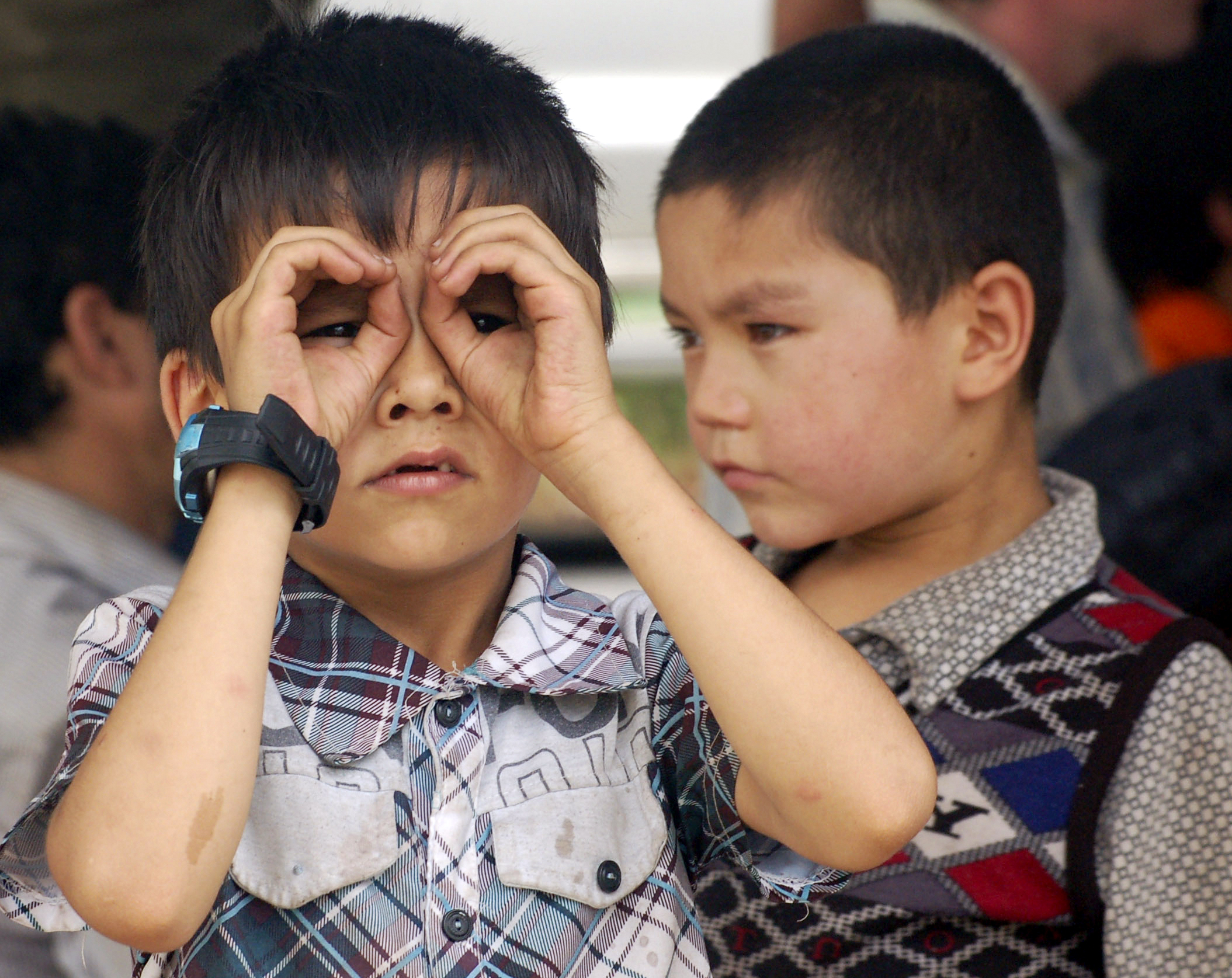The plight of the Muslim Uighur minority group in China’s far-western Xinjiang region made headlines again this week.
Last weekend, drone footage emerged from Xinjiang that showed bound and blindfolded men at a Chinese train station. Heads shaved, donned in blue vests, and closely guarded by Chinese security forces, the men can be seen being led off to what many believe to be a detention centre – or, as the Chinese government have coined them, ‘re-education camps’.
But as countries worldwide have slowly started to call out Chinese actions towards the Uighur, in Southeast Asia, with its chequered history on the issue, silence has once again abounded among the region’s governments.
On the BBC’s Andrew Marr Show, the Chinese Ambassador to the UK, Liu Xiaoming, was shown the footage. Deriding it as “fake”, Xiaoming denied that there was an effort to persecute the Uighur population. “There is no so-called massive forced sterilisation among Uighur people in China – it is against the truth,” he said.
On Monday, the US government barred 11 Chinese companies from purchasing American goods, saying the firms were complicit in human rights violations in China’s campaign targeting Uighurs in Xinjiang. Those sanctioned included current and former suppliers to Apple, Google, Hugo Boss, among others. Earlier this month, US authorities seized a shipment of products made from human hair, believed to have been taken from Uighurs in camps.
The Turkic-speaking Muslim minority are ethnically distinct from China’s Han-majority population, and have long held advocated for greater autonomy from Beijing. Sometimes violent Uighur rebellion has led the Chinese Communist Party to violently suppress dissent and force assimilation into Chinese culture.
Southeast Asia has not been a hospitable host to the Uighur. Rather than helping them secure a path to safety in Turkey, a country that actively welcomes the group, the region has a history of ushering them into immigration detention centres or shipping them back to China.
In 2019, no Southeast Asian country joined the likes of the UK and Australia in criticising Chinese policies in Xinjiang, in a letter to the UN Human Rights Council. Instead, the Philippines, Laos, Myanmar and Cambodia joined 33 other countries – among them Russia, Saudi Arabia and North Korea – in defending China in a direct rebuke to Western criticism.
All four countries, as well as Southeast Asia as a whole, have significant economic ties with China, and risk damaging diplomatic relations should they not show support for Beijing on the issue.
Cambodia itself has a record of deporting Uighurs who have arrived at its borders. In July 2009, after unrest in Xinjiang’s capital, Ürümqi, the first Uighur arrived in Cambodia. A further 21 would follow, including a pregnant woman and two children.
But on December 19 that year, while their asylum applications were being processed, 20 of the group were rounded up by gunpoint in Phnom Penh, and forced onto a charter plane, labelled a ‘VIP flight’ by authorities, bound for China. Their deportation came the day before a visit from the then-Chinese Vice President, Xi Jingping. Days later, China and Cambodia signed a bilateral deal worth up to $1 billion in loans and grants.
Cambodia has also been vocal in its praise for its neighbour Thailand for doing the same.

In July 2015, Thai authorities sent 172 Uighurs to Turkey, but at the same time deported a further 109 alleged terrorist suspects back to China, despite concern over their treatment at hands of Chinese security forces. Footage showed the 109 passengers sitting on the China Southern charter flight hooded and flanked on either side by Chinese security guards. A month later, pan-Turkic ultra-nationalist organisation the Grey Wolves is alleged to have committed a bombing at Erawan Shrine in the centre of Bangkok that killed 20 people and injured a further 125 in retaliation for the deportations.
Phay Siphan, spokesperson for Cambodia’s government, praised Thailand’s actions in deporting the men. “Thailand has shown respect to the sovereignty of China for not interfering in its internal affairs,” he said.
Since the mass deportation in 2017, Thailand has detained Uighur in immigration detention centres and jails, as opposed to deportation. In January 2020, seven Uighur refugees escaped from a cell in Thailand’s Mukdahan province, before being captured by authorities. Around 50 Uighur – those who remain from the deported group in 2015 – have been held for over five years across four different sites in Thailand.
In 2010, Laos also deported seven Uighur, a husband and wife with their five children. The husband, Memet Eli Rozi, was then sent to Kashgar prefecture detention center. Myanmar, too, deported 17 Uighur back to China in 2011. In Vietnam, five Uighur were shot and killed by Chinese guards in 2014 on the Chinese-Vietnamese border with questions over the “unusually fast” transfer of bodies to the Chinese side and commentator Carlyle Thayer telling the BBC that Vietnam appeared to be “under pressure from China to detain and repatriate Uighur asylum seekers”.
There have been suggestions of lobbying by Beijing buying the silence of groups in Indonesia, with leading Indonesian Muslim organisations criticised for remaining silent
Even Indonesia, the country with the largest Muslim population in the world, has also refrained from publicly advocating for the Uighur.
In December 2019, Indonesian president Joko Widodo’s chief of staff, Moeldoko, said that it was not for Indonesia to interfere in Chinese domestic affairs. “Each country has its own sovereignty to regulate its citizens,” he said.
There have also been suggestions of lobbying by Beijing buying the silence of groups in the country, with leading Indonesian Muslim organisations criticised for remaining silent and reportedly receiving donations and assistance to keep quiet on the issue.
Only Muslim-majority Malaysia has been an outlier in the region in its treatment of the Uighur, and even then only under former premier Mahathir Mohamad, a leader who held a “pro-Japan, anti-China” reputation as he ruled the country for a second stint between 2018 and 2020.
In 2018, then-prime minister Mahathir refused China’s extradition request for 11 Uighur who had fled to Malaysia after breaking out of prison in Thailand. “If Uighurs are fleeing to Malaysia to seek asylum, Malaysia will not extradite them even if there is an application from China to do so,” he said. In January 2020, two months prior to Mahathir’s resignation, the Malaysian government also set up a body to investigate reports of mistreatment of Uighur in China.
Even so, pre-Mahathir Malaysia, however, was also complicit in deporting Uighur. Between 2013 and 2017, the country deported 28 individuals back to China, alleging that some of the men were using Malaysia as a pathway to join terrorist organisations in the Middle East.
It remains to be seen how Malaysia’s stance towards the Uighur will evolve under new premier Muhyiddin Yassin.
With economic and diplomatic concerns taking precedent in relations with China over human rights considerations, Southeast Asia looks unlikely to speak out against the escalation of China’s re-education policies in Xinjiang.
If this week is anything to go by, the region, it seems, will continue to remain silent on the Uighur issue for some time yet.


